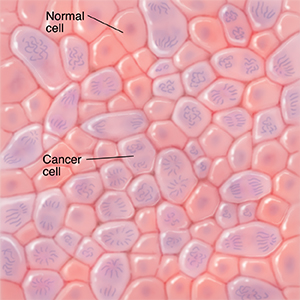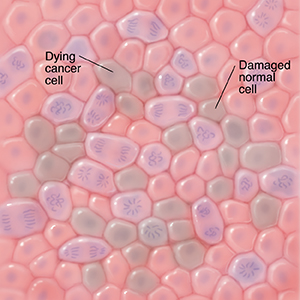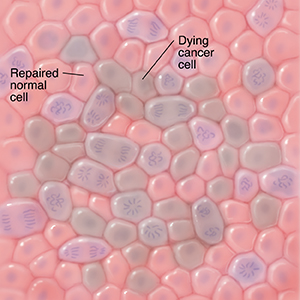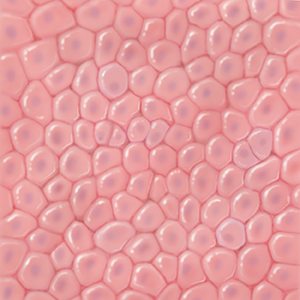Radiation therapy is a common cancer treatment. It uses beams of high-energy X-rays or particles to kill cancer cells or keep them from growing.
What is cancer?
Normally, cells in the body grow and divide in a controlled way when they're needed. Cancer starts when cells change (mutate) and grow out of control. The changed (abnormal) cells often grow to form a lump or mass called a tumor. Cancer cells can also grow into (invade) nearby areas. They can spread to other parts of the body, too. This is called metastasis.
How radiation therapy works
Radiation kills cancer cells over time by damaging the genes in the cells. It works best on cells that are growing fast, like cancer cells.
Radiation therapy is often given every day over many weeks. The goal is to kill as many cancer cells as possible. Radiation can also harm or kill normal cells that are close to the tumor. But damaged normal cells are better able to fix themselves than cancer cells. As treatment goes on, more cancer cells are killed than normal cells, and the normal cells fix themselves. Cancer cells can't fix themselves as well as normal cells. Over time, they die and are cleared by the body.




Types of radiation therapy
Different kinds of radiation therapy can be used to treat cancer. These are the three main ways radiation is given:
External beam radiation therapy
With external beam radiation therapy (EBRT), a large machine aims high-energy beams into the body and at the tumor. The goal of treatment is to kill all of the cancer cells while limiting damage to normal cells. The machine moves so it can send the beams into your body from any angle.
Newer types of EBRT focus the radiation more precisely at the tumor. This helps to protect nearby normal tissues. These newer types include:
-
3-D conformal radiation therapy (3-D CRT)
-
Intensity-modulated radiation therapy (IMRT)
-
Electron beam therapy
-
Proton beam particle therapy
-
Stereotactic radiosurgery or stereotactic ablative radiotherapy
Internal radiation therapy (brachytherapy)
Internal radiation uses radioactive needles, wires, seeds, or pellets that are put right into or near the tumor. These may be permanent (left inside the body) or temporary (the radioactive sources are removed after treatment).
The implants mean the radiation can be put very close to the cancer cells. This type of radiation travels only a very short distance. This helps focus the treatment on the cancer cells and spares nearby normal cells.
Systemic radiation therapy
Radiation therapy can be given as a liquid that's swallowed or put right into your blood through a vein. Or it can be given as an injection (shot) of tiny radioactive beads that are put into a vein (IV) or artery at the tumor (called radioembolization). Sometimes, the radiation is attached to a special antibody. This antibody binds to the cancer cells and targets them with radiation. It moves through the blood to reach tumors anywhere in the body. Once the radiation attaches to the cancer cells, it gives off small, controlled doses to kill the cancer cells.
Will treatment make me radioactive?
This depends on the type of treatment:
-
External radiation therapy. This radiation comes from a large machine that sends beams of radiation into your body. It will not make you radioactive. You don’t have to worry about being near friends or family members, including young children or babies.
-
Internal radiation therapy. This means the radioactive material is put into your body. In some cases, you may be radioactive for a short time. Your healthcare team will tell you what you need to do to protect other people. Make sure to talk with your healthcare team about any concerns and questions.
Questions
If you have questions, the number to call based on which facility you received treatment at:
-
Buffett Cancer Center: (402) 552-3844
-
Village Pointe: (402) 596-3302
-
Weekend/Night on Call (Buffett or Village Pointe): (402) 552-3844
-
Kearney Cancer Clinic: (308) 296-5850
-
Kearney Weekend/Night on Call: (308) 296-5850